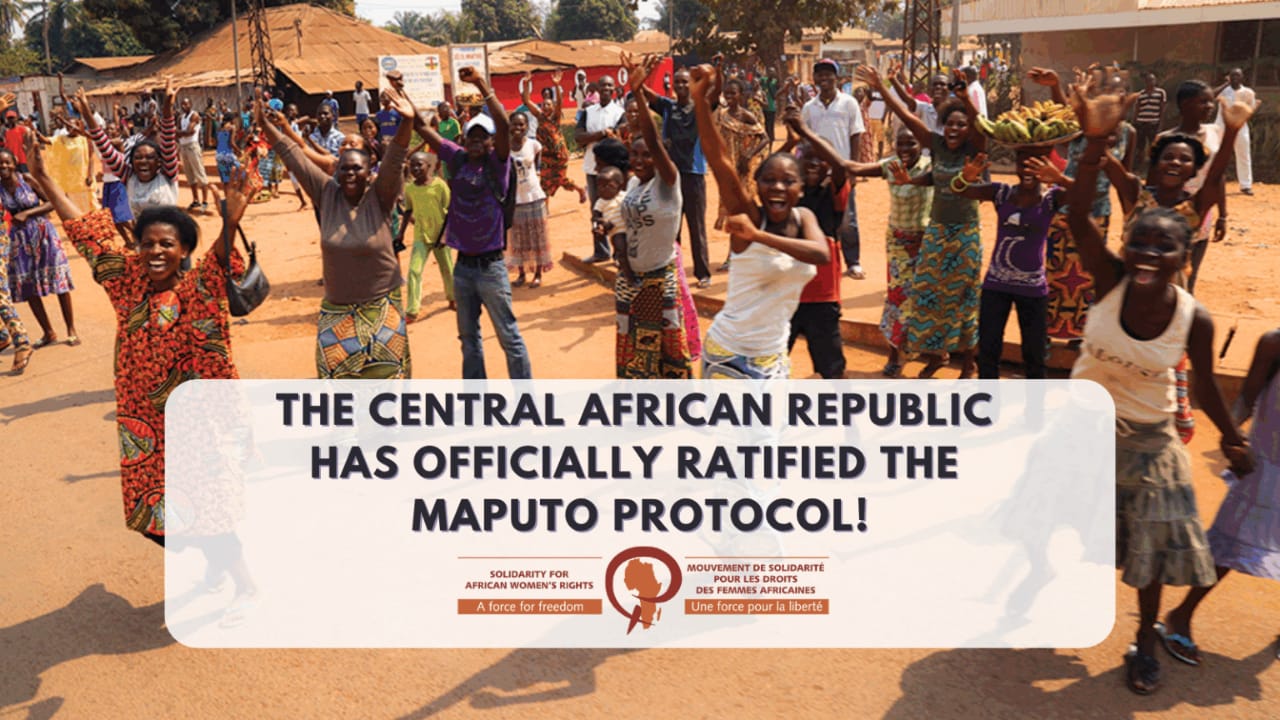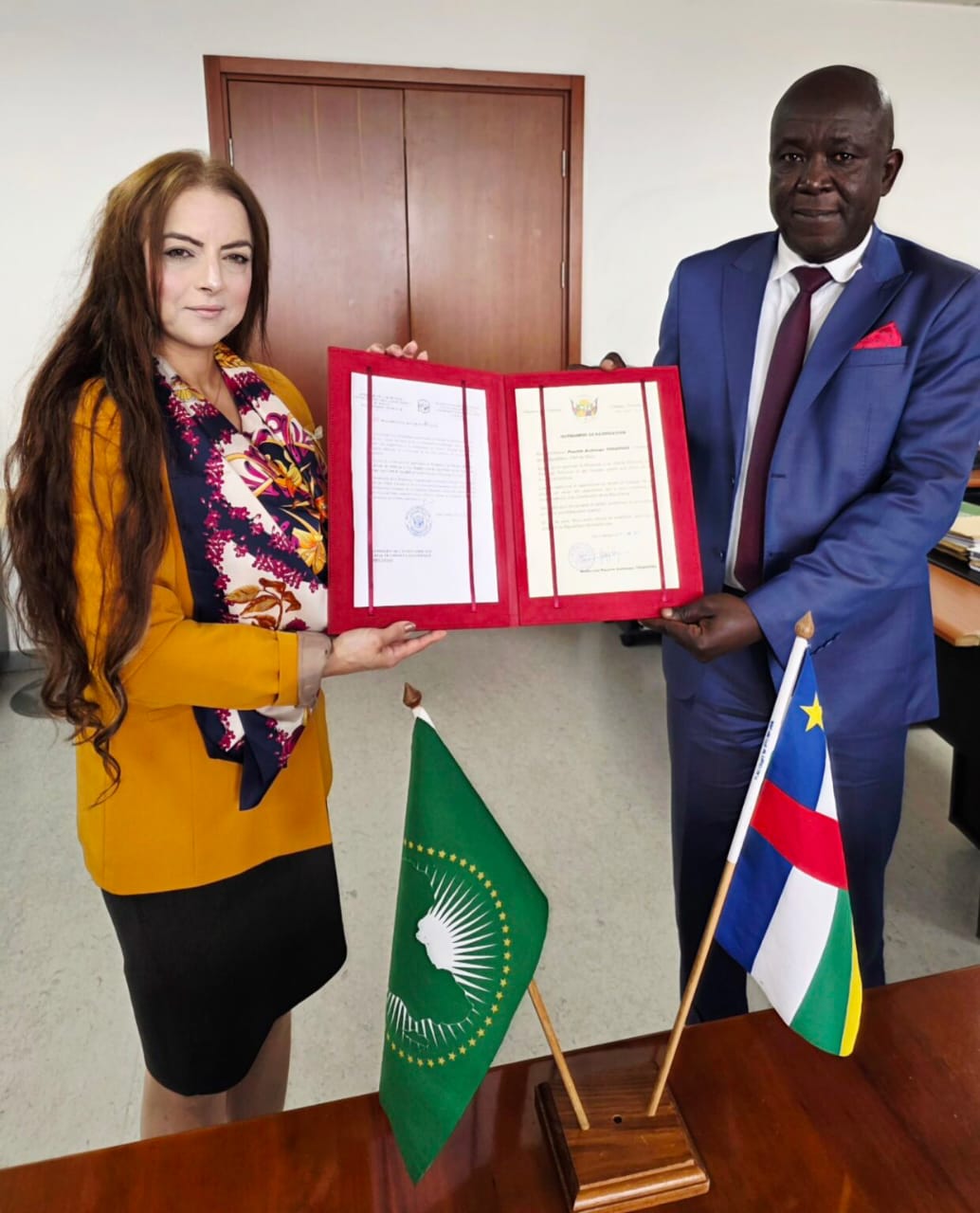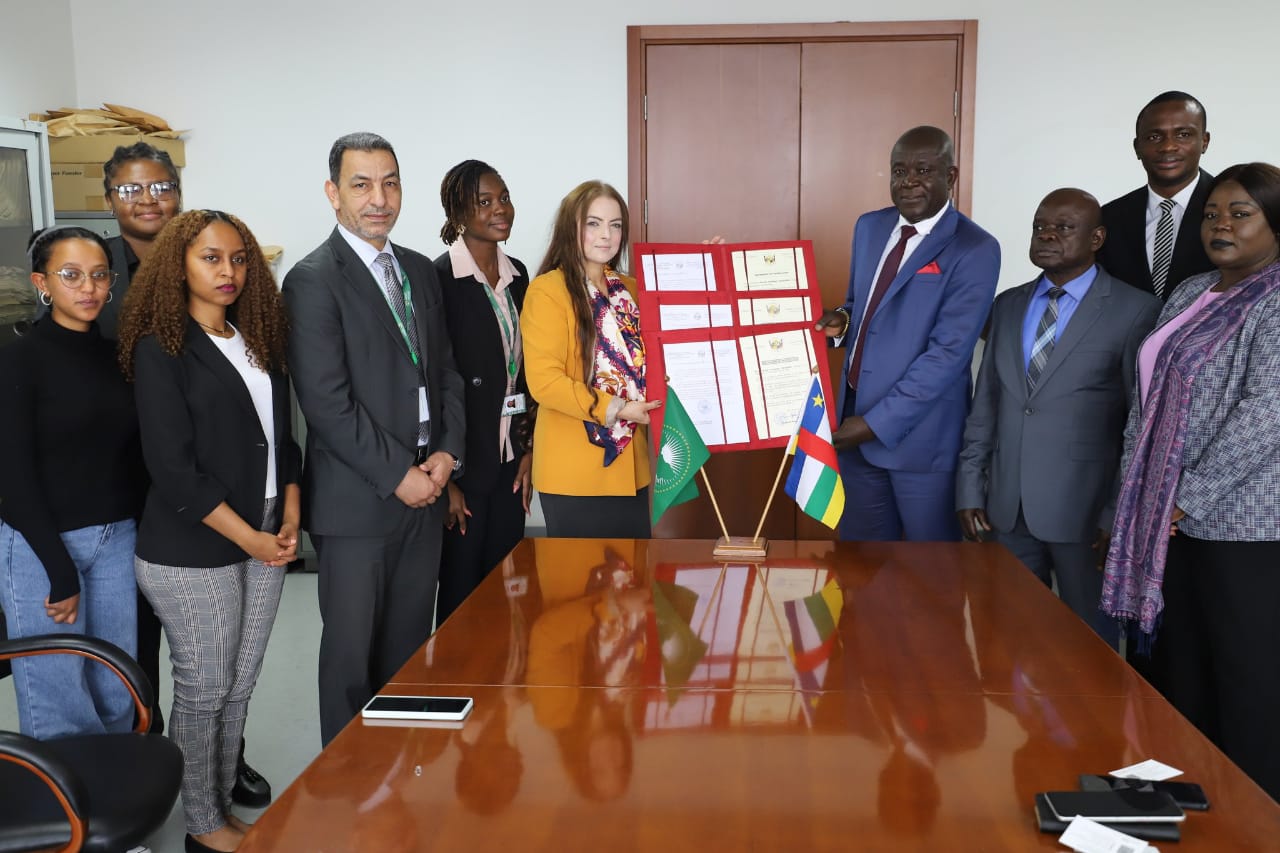
Central African Republic Ratifies Maputo Protocol, Becomes 46th AU Member State To Commit To Women’s Rights

The Central African Republic (CAR) has officially ratified the Maputo Protocol, becoming the 46th African Union (AU) Member State to commit to advancing and protecting the rights of women and girls across the continent.
The Protocol to the African Charter on Human and Peoples’ Rights on the Rights of Women in Africa, adopted by the AU in 2003, is one of the most comprehensive legal frameworks on women’s rights worldwide. It obligates African governments to end violence against women and girls, ensure reproductive rights, eliminate harmful practices such as child marriage and female genital mutilation (FGM), and guarantee equal participation in political, economic, and public life.

CAR Minister-Counsellor Gilbert Touangai presenting the instrument of ratification.
On July 29 2025, CAR deposited its instruments of ratification, marking a new beginning for a country long affected by insecurity, weak governance, and violence that excessively affected women and girls. With this, the government has made a public commitment to ending legal discrimination and strengthening laws and policies to uphold and protect women’s rights.

CAR delegation led by Minister-Counsellor Touangai.
The ratification follows sustained advocacy led by the Solidarity for African Women’s Rights Coalition (SOAWR), a network of over 70 women’s rights groups across 33 countries.
On June 25, 2025, SOAWR members led a delegation to CAR, spearheaded by Jacques Bandji of the Women’s Counselling and Information Centre (Cameroon) and Dr. Tom Mulisa of the Great Lakes Initiative for Human Rights and Development (Rwanda). The gathering, attended by more than 40 participants, including CAR’s Minister for Gender Promotion, Women’s Protection, Family and Children, Dr. Marthe Augustine Kirimat, laid the groundwork for the AU Commission-led mission in July that secured ratification.
Reflecting on the achievement, Barrister Yveline Ntanfai (WCIC) said, “An effective collaborative advocacy, depending on who you surround yourself with, leads to successful goal achievement, as with the CAR mission. Today, the Central African Republic stands tall as the 46th AU Member State to ratify the Maputo Protocol. This milestone is the result of considerable efforts by government leaders, women’s rights advocates, and regional partners. It is a powerful testament to what we can achieve through collaboration to advance the rights of women and girls.”
The Maputo Protocol requires governments to enact laws protecting women from gender-based violence, ensure survivor-centred services such as legal aid, and outlaw harmful practices. The Protocol has already influenced courts across Africa. Between 2019 and 2024, judges in 11 countries cited the treaty in 26 landmark rulings, emphasising its growing role in shaping jurisprudence and accountability.
Despite advances, threats to women’s rights remain. In The Gambia, groups have challenged the country’s FGM ban before the Supreme Court, raising fears of regression. Against this backdrop, the Maputo Protocol acts as a legal safeguard.
Esther Waweru, Senior Legal Advisor at Equality Now, noted that “this is a defining moment for Africa. The Central African Republic’s ratification of the Maputo Protocol sends a powerful message that progress on women’s rights continues. But it must not stop here. Over the past two decades, the treaty has driven significant legal advances across the continent. Yet, challenges remain, and sustained effort is needed for its promises to be entirely realised in every African country.”
She urged more AU states to follow suit, adding that “while we celebrate the Central African Republic’s ratification of the Maputo Protocol, we keep in mind all the African Union Member States that have not yet prioritised full ratification, domestication, and implementation of the treaty, leaving millions without the comprehensive legal protection they are entitled to. We urge these governments to act without delay to uphold their obligations under the Protocol and ensure no woman or girl is left behind; not in law, not in practice, and not in progress.”
With the official ratification, CAR will now work towards full implementation, ensuring that the commitments in the treaty translate into fundamental protections and opportunities for women and girls in the country and across Africa.
Read More:
- Senegal’s President Faye Celebrates Japan Ties, Invites Global Partners To Dakar For Invest In Senegal Forum
- Nigeria Arrests Palestinian Community Leader Ten Days After Signing ‘Security’ Pact with Israel
About The Author
Related Articles
Asake Sets New Billboard Afrobeats Record as Chart Presence Grows
Asake has further cemented his place as one of Afrobeats’ most dominant...
ByWest Africa WeeklyJanuary 29, 2026Nigerians Lament PayPal’s Return as Old Wounds Resurface
PayPal’s reentry into Nigeria through a partnership with local fintech company Paga...
ByWest Africa WeeklyJanuary 29, 2026Tanzania Eyes Gold Sales as Aid Declines and Infrastructure Needs Grow
Tanzania is weighing plans to sell part of its gold reserves to...
ByWest Africa WeeklyJanuary 29, 2026Mali Tightens Grip on Explosives Supply With New Majority Stake
The Malian government has taken majority ownership of a civil explosives manufacturing...
ByWest Africa WeeklyJanuary 29, 2026












Leave a comment